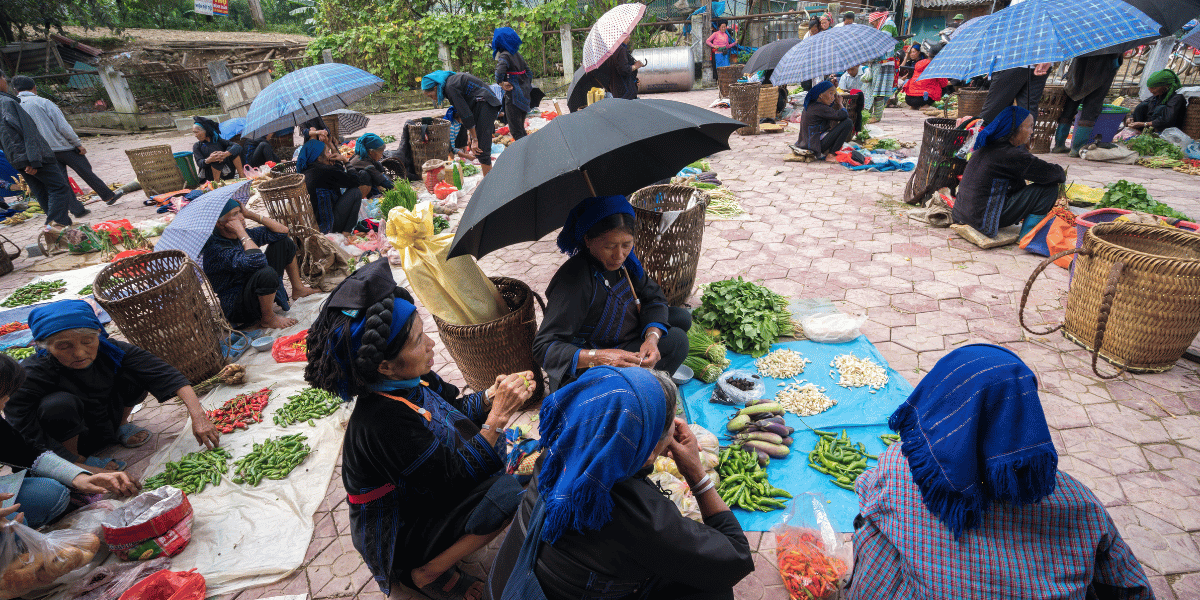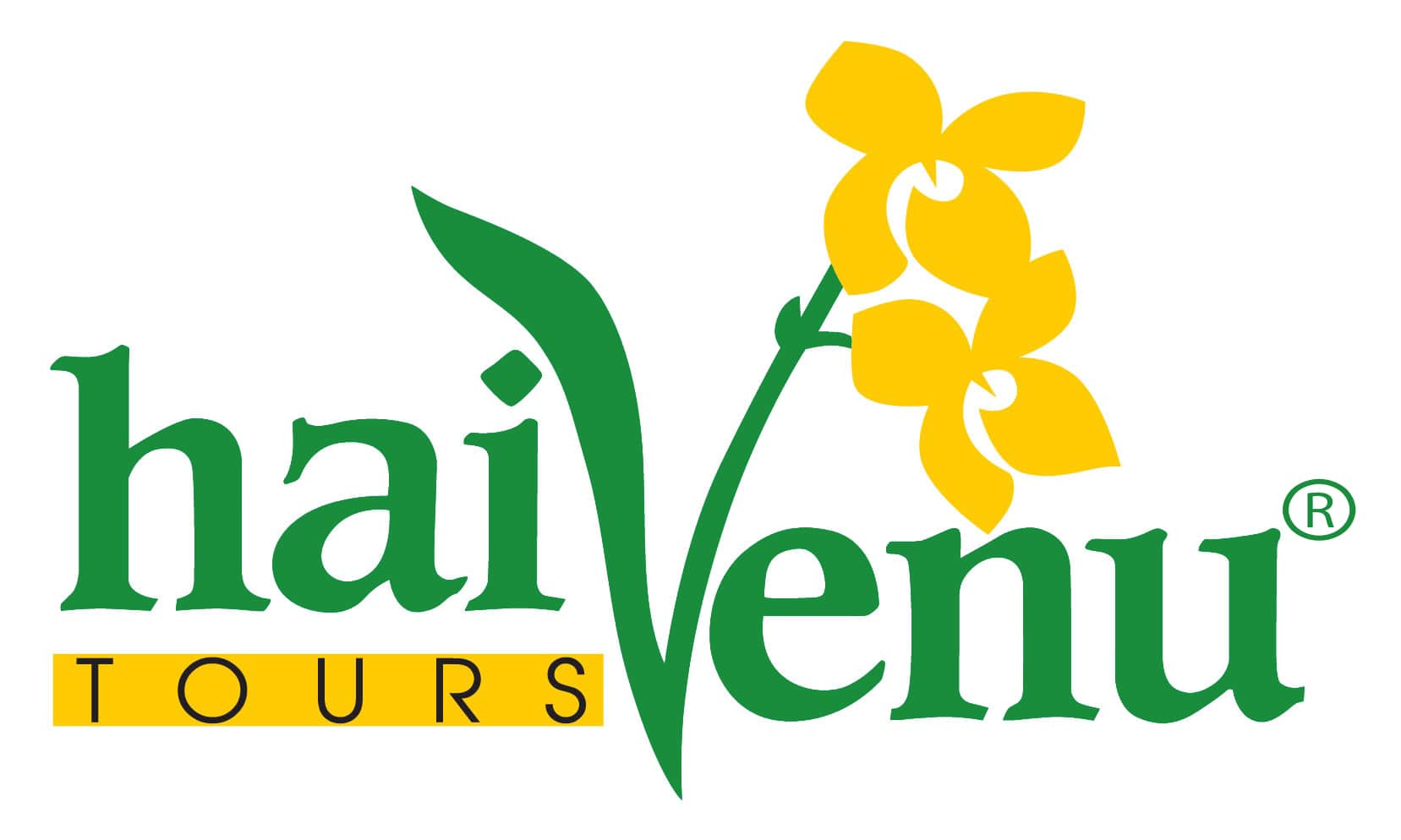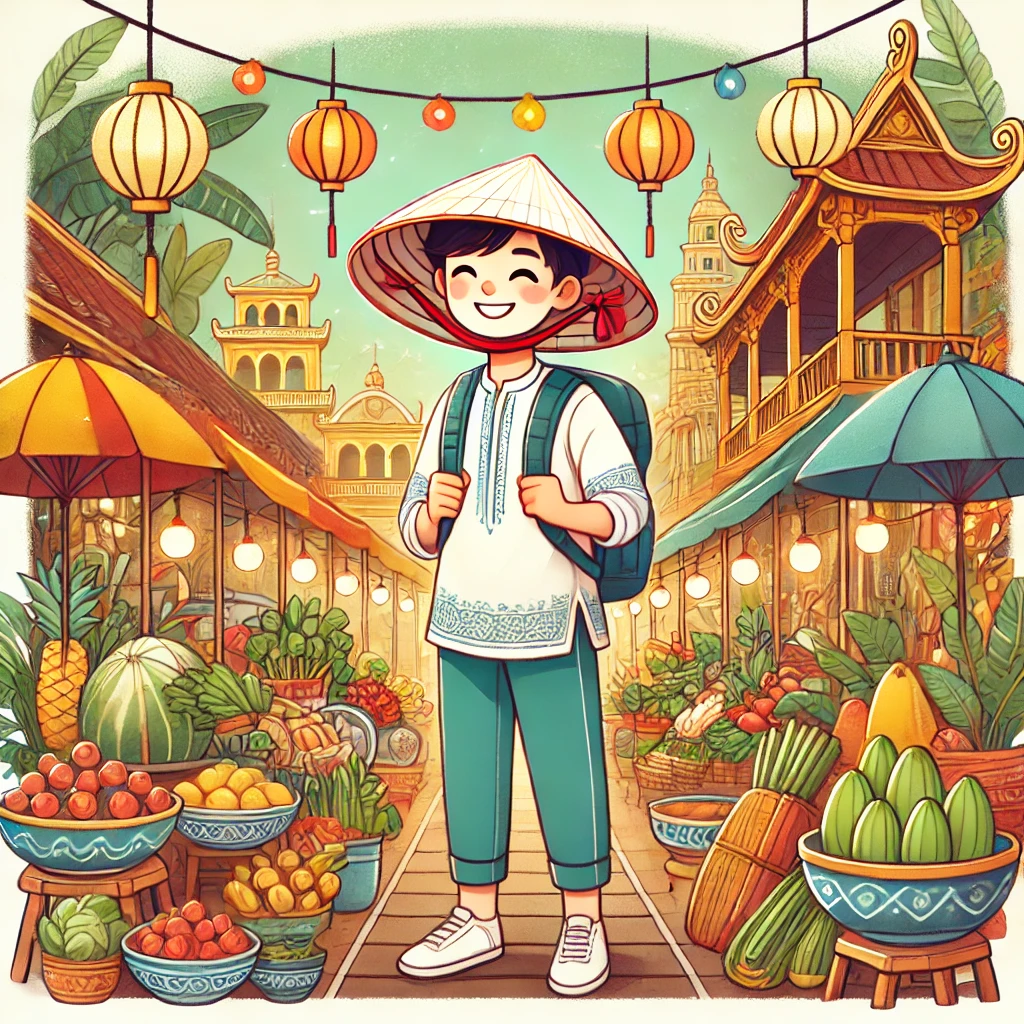Interesting Facts About Vietnam
Last Updated on 1 April, 2025 by admin
Vietnam is a country that effortlessly blends ancient traditions with modern charm, captivating the hearts of travellers from around the globe. Nestled in the heart of Southeast Asia, it boasts a rich tapestry of history, culture, and natural beauty that makes it truly one of a kind. Whether you’re drawn to its vibrant street food, bustling cities, or lush landscapes, Vietnam offers an experience unlike any other.
In this article, we’ll explore some of the most interesting facts about Vietnam, from its diverse geography and cultural heritage to fun and surprising traditions that might just amaze you. Whether you’re planning your first trip or simply curious about Vietnamese culture and history, these Vietnam facts will deepen your appreciation for this dynamic nation.
So, if you’re looking for fun facts about Vietnam, keen to learn about Vietnamese people and traditions, or just want to discover what makes this country a hidden gem of Southeast Asia, read on — Vietnam has a story worth telling.
Geography and Nature: A Country of Diverse Landscapes
Vietnam’s geography is as fascinating as its culture, offering an incredible variety of landscapes packed into a narrow, S-shaped strip of land. Stretching over 1,600 kilometres from north to south, the country is home to soaring mountains, lush valleys, tropical forests, and stunning coastlines.
One of the most iconic Vietnam geography facts is the existence of Ha Long Bay, a UNESCO World Heritage Site known for its emerald waters and towering limestone islands. In the north, the mountain ranges of Sapa offer misty vistas and terraced rice fields, while the Mekong Delta in the south showcases a labyrinth of rivers, canals, and floating markets.
Vietnam also boasts over 3,000 kilometres of coastline, making it a haven for beach lovers and adventurers alike. From the white sands of Da Nang to the peaceful shores of Phu Quoc Island, the country’s natural beauty is both diverse and awe-inspiring.
Whether you’re a nature enthusiast or simply seeking breathtaking views, Vietnam’s unique landscapes are sure to leave a lasting impression. It’s no surprise that this Southeast Asian gem is fast becoming a top choice for eco-tourism and nature-based travel.
Read More:

History Highlights: From Ancient Dynasties to Modern Days
Vietnam’s history is rich, complex, and deeply rooted in resilience. For over 4,000 years, the country has evolved through periods of independence, foreign rule, and national unification — all of which have shaped the proud identity of the Vietnamese people.
One of the most fascinating Vietnam history facts is the ancient Dong Son culture, which dates back to around 1000 BCE and is renowned for its sophisticated bronze drums and early agricultural development. Throughout the centuries, Vietnam was ruled by powerful dynasties, such as the Ly, Tran, and most notably the Nguyen Dynasty, which was the last imperial family before the French colonisation.
The country spent nearly a century under French colonial rule, which significantly influenced Vietnamese architecture, education, and cuisine. This era ended in the mid-20th century after the First Indochina War, leading to the eventual division of Vietnam into North and South.
Of course, no historical overview would be complete without mentioning the Vietnam War (known locally as the American War), a pivotal event in modern Vietnamese history. Despite the immense hardship, the country emerged reunified in 1975 and began its journey towards economic and social recovery.
Today, Vietnam stands as a nation that has risen from the ashes of conflict, embracing progress while honouring its past. These historical facts about Vietnam offer a deeper understanding of its strength, determination, and national pride.
Read More Classic Cultural Tours

Cultural Riches: Festivals, Food, and Traditions
Vietnam’s culture is a vibrant blend of age-old traditions, spiritual beliefs, and everyday rituals that continue to thrive in modern life. From colourful festivals to time-honoured dishes, the country’s rich heritage is deeply woven into the daily lives of its people.
One of the most important Vietnam culture facts is the central role of family and community. Respect for elders, ancestor worship, and strong family bonds remain essential pillars of Vietnamese society. This deep-rooted tradition is beautifully reflected during Tết – the Vietnamese Lunar New Year – the country’s most celebrated festival, where families reunite, honour their ancestors, and welcome a prosperous new year.
Vietnamese cuisine is another defining element of the national identity. Known for its balance of flavours and fresh ingredients, it’s no surprise that Vietnamese food culture has captured global attention. Iconic dishes like phở, bánh mì, and gỏi cuốn are enjoyed across the world, while locally, the country’s bustling street food scene is an experience in itself. Don’t forget to try a strong cup of Vietnamese coffee, often served with condensed milk – a must for any food lover.
Cultural traditions in Vietnam also shine through in its clothing and arts. The áo dài, Vietnam’s national dress, symbolises elegance and grace, while water puppetry, an art form that dates back centuries, continues to enchant audiences with its storytelling and craftsmanship.
Whether you’re attending a lantern-lit festival in Hội An or simply sharing a meal with locals, Vietnam offers a cultural experience that is both meaningful and unforgettable.
Read More:
Language and People: A Nation of Warm Hospitality
One of the most striking things about Vietnam is the warmth and friendliness of its people. Whether you’re exploring the buzzing streets of Hanoi or wandering through a quiet village in the countryside, you’re likely to be greeted with genuine smiles and heartfelt hospitality. This welcoming spirit is an essential part of what makes Vietnam so memorable for visitors.
When it comes to communication, the Vietnamese language is both beautiful and unique. It’s a tonal language that uses the Latin alphabet, introduced during the colonial period, making it relatively accessible for those who wish to learn the basics. There are six tones in Vietnamese, and a change in tone can completely alter the meaning of a word — a fascinating challenge for language learners! This is one of the most intriguing Vietnamese language facts.
Vietnam is also home to 54 recognised ethnic groups, each with its own language, customs, and clothing styles. While the majority of the population is Kinh (or Viet), ethnic minorities such as the Hmong, Tay, and Khmer contribute to the country’s rich cultural diversity. Learning about these communities offers a deeper understanding of the Vietnamese people and their multifaceted identity.
Despite modernisation, values such as respect, humility, and harmony remain deeply embedded in social interactions. It’s common to see multi-generational households, close-knit neighbourhoods, and a strong emphasis on education and hard work.
Whether you’re asking for directions, sharing a meal, or simply observing daily life, you’ll quickly realise that hospitality in Vietnam isn’t just a custom — it’s a way of life.
Read More:
Economy and Development: From Agriculture to Tech Growth
Vietnam has undergone a remarkable transformation over the past few decades. Once a primarily agrarian society, the country is now recognised as one of the fastest-growing economies in Southeast Asia. This journey from rice fields to high-tech zones is one of the most impressive Vietnam economy facts.
Traditionally, agriculture in Vietnam played a central role, with rice being the dominant crop — a symbol of livelihood and culture. Even today, Vietnam is one of the world’s leading exporters of rice, coffee, and seafood. However, since the Đổi Mới (Renovation) economic reforms in the late 1980s, Vietnam has steadily diversified its economy.
Manufacturing, particularly in textiles, electronics, and machinery, has become a major contributor to GDP. Cities like Ho Chi Minh City and Hanoi have emerged as dynamic business hubs, attracting foreign investment and expanding the middle class.
More recently, Vietnam has seen a surge in its technology sector, with a growing number of start-ups and digital innovations. From fintech and e-commerce to AI development, the country is fast becoming a regional player in the digital economy. These developments highlight some of the most exciting Vietnam economic growth stories of the 21st century.
Challenges still exist — including infrastructure demands and skilled labour shortages — but Vietnam’s resilience and openness to global trade continue to drive progress. As a result, it’s not only a country rich in history and culture but also one that offers economic opportunities and a forward-looking outlook.
Read more:
Fun & Quirky Facts: Things You Didn’t Know
Beyond its breathtaking landscapes and rich traditions, Vietnam is full of unexpected surprises that often catch travellers off guard — in the best way possible. If you’re a fan of trivia or simply love discovering the little things that make a country unique, these fun facts about Vietnam are sure to delight you.
For starters, did you know that Vietnam is home to the world’s largest cave? Son Doong Cave, located in Phong Nha-Kẻ Bàng National Park, is so vast it has its own ecosystem, weather system, and even a jungle inside. It’s one of the most jaw-dropping natural wonders in Vietnam.
Another quirky fact: Vietnam has more motorbikes than people in some cities! With an estimated over 45 million scooters and motorbikes, the chaotic but mesmerising traffic flow is something you have to see to believe. Crossing the street in Hanoi or Ho Chi Minh City? Just walk steadily — the bikes will somehow go around you!
Vietnam is also one of the world’s top coffee exporters, but the way locals enjoy coffee might surprise you. Instead of your standard espresso or latte, try egg coffee (cà phê trứng) — a rich, creamy concoction made from whipped egg yolk, sugar, and robust Vietnamese coffee. Trust us, it’s better than it sounds.
And here’s another charming oddity: water puppetry is a traditional Vietnamese art form where colourful puppets perform on water, accompanied by live folk music. It originated in rice fields centuries ago and is still performed today in theatres across the country.
From rice being served at nearly every meal to the lucky charm of red envelopes during Tết, Vietnam is bursting with curious customs and surprising facts that add extra flavour to your travel experience.
Read More:
Travel Tips and Must-See Destinations
If Vietnam isn’t already on your travel bucket list, it should be. With its stunning scenery, delicious food, and warm-hearted locals, the country offers an unforgettable experience for every type of traveller. Whether you’re after adventure, culture, or relaxation, these Vietnam travel facts and tips will help you make the most of your journey.
Let’s start with a few practical travel tips for Vietnam. Firstly, while major cities like Hanoi and Ho Chi Minh City are buzzing with life, don’t overlook the quieter towns and countryside — places like Hoi An, Ninh Binh, and Sapa offer authentic charm and scenic beauty. Always carry cash, especially when travelling outside big cities, and be prepared to haggle in markets — it’s part of the fun!
When visiting temples and religious sites, dress modestly and remove your shoes before entering. A respectful attitude will take you far, especially in a country where tradition and etiquette still matter deeply.
Now, onto the highlights! Among the must-visit places in Vietnam are:
- Ha Long Bay – for its surreal seascape of limestone karsts
- Hue – the former imperial capital rich in history
- Da Nang – where beaches meet modern city life
- Phong Nha – for caving adventures and eco-tourism
- Mekong Delta – with floating markets and river life
Also, make sure to enjoy a street food tour, hop on a local motorbike ride, and if possible, time your trip with major festivals like Tết or the Mid-Autumn Festival to experience Vietnamese culture at its most vibrant.
Getting a visa to Vietnam is usually straightforward, with e-visa options available for many nationalities. Just check the latest requirements before your trip.
With a mix of adventure and serenity, modern comforts and ancient traditions, Vietnam promises a travel experience that’s as enriching as it is exciting.
Read More:
- Hanoi Tour
- Ho Chi Minh City Tour
- Can Tho Tour
- Adventure Tours
- Sightseeing Activities
- Tour by Duration – 8 to 14 Days
Conclusion: Why Vietnam is More Than Just a Destination
Vietnam isn’t just a place you visit — it’s a country you feel. From its dramatic landscapes and time-honoured traditions to the warmth of its people and the irresistible aroma of street food, Vietnam leaves an impression that lingers long after you’ve returned home.
Whether you came for the natural beauty, stayed for the cultural richness, or were surprised by its modern energy, every journey through Vietnam tells a different story. And with so many layers of history, flavours, and local charm, there’s always more to discover.
These fascinating facts about Vietnam only scratch the surface of what this remarkable country has to offer. Whether you’re an avid traveller, a cultural explorer, or someone simply curious about the world, Vietnam invites you to look deeper and experience more.
So if you’re still wondering whether to add Vietnam to your travel plans — the answer is simple: absolutely. It’s not just a destination; it’s an experience. One filled with authentic encounters, unexpected delights, and memories that will stay with you for a lifetime.




